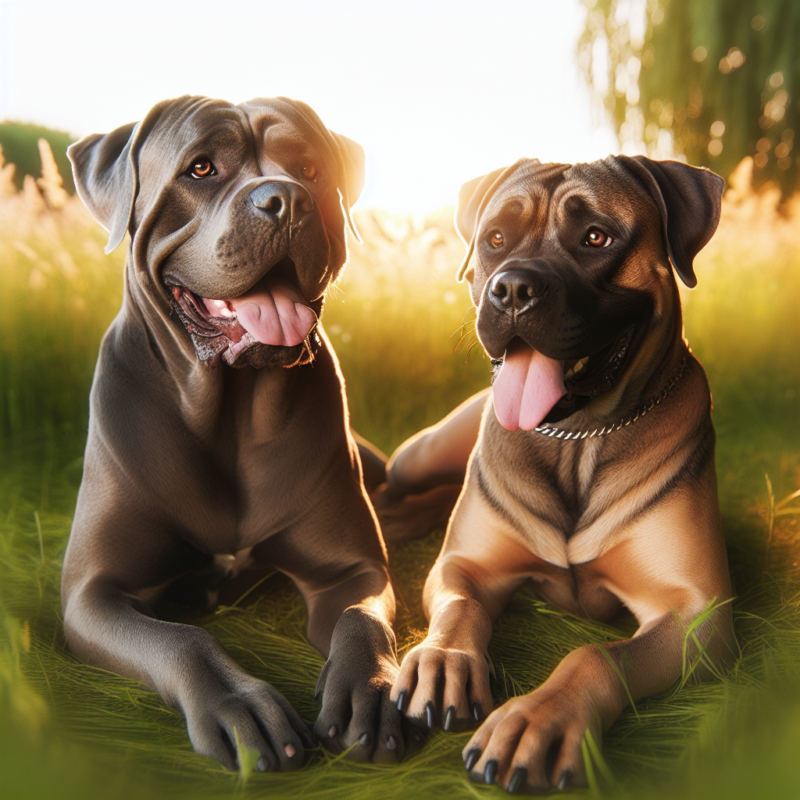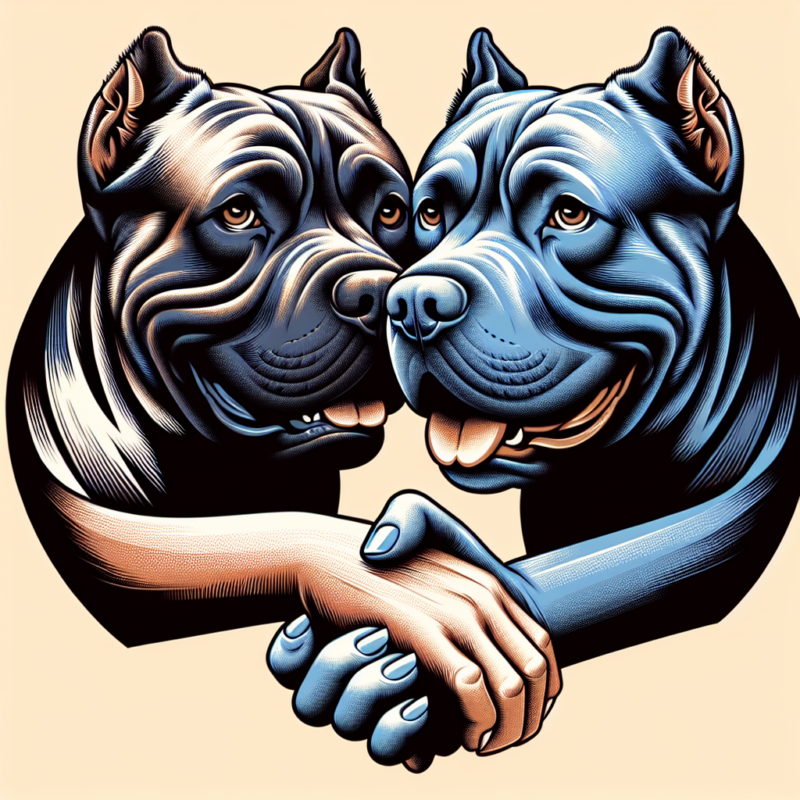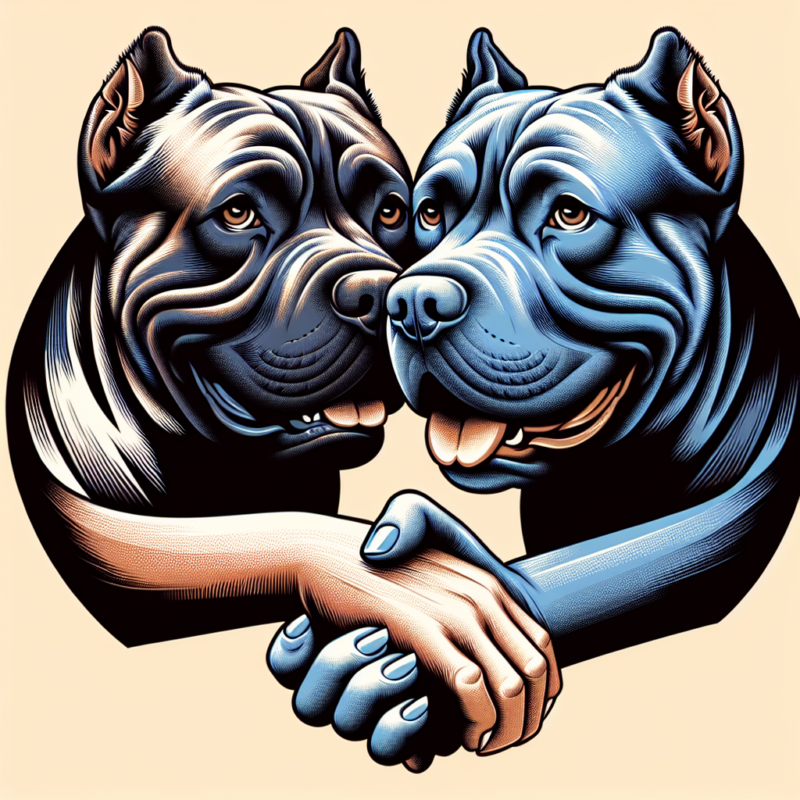If you’re considering welcoming a cane corso into your home, you may be wondering about their compatibility with other dogs. Well, rest assured, because in this article we will explore the temperament and social behavior of cane corsos when it comes to other dogs. Discover whether these magnificent Italian mastiffs are a friendly breed that can get along well with their four-legged counterparts or if they possess qualities that make them better suited to be the only dog in the household. So, grab a cup of tea and let’s delve into the fascinating world of cane corsos and their relationships with other dogs!
Physical Characteristics of Cane Corsos
Size and weight
Cane Corsos are large and powerful dogs, known for their impressive size and strength. They typically weigh between 90 to 120 pounds and have a height ranging from 23.5 to 27.5 inches at the shoulder. Their robust build and muscular physique give them a commanding presence.
Muscular build
One of the most notable physical characteristics of Cane Corsos is their substantial, well-defined muscles. Their strong bodies and thick bones contribute to their overall strength and endurance. This muscular build allows them to excel in various activities such as agility, obedience, and protection work.
Coat and colors
Cane Corsos have a short, dense coat that lies close to their body, providing them with excellent protection against different weather conditions. They have a wide range of coat colors, including black, fawn, gray, and brindle. Some dogs may also have small patches of white on their chest and toes. Their sleek coat is relatively low-maintenance, requiring occasional brushing to remove loose hairs.
Temperament of Cane Corsos
Protective nature
Cane Corsos have a natural instinct to protect their families and territory. They are incredibly loyal and have a strong sense of guardianship. This protective nature makes them excellent watchdogs and guard dogs. However, it is essential to socialize them properly from an early age to ensure they understand when it is appropriate to be protective and when to remain calm.
Intelligence
Cane Corsos are highly intelligent dogs. They are quick learners and have a remarkable ability to understand and follow commands. Their intelligence makes them adaptable and responsive to training, making them an ideal choice for experienced dog owners who can provide consistent and positive reinforcement-based training methods.
Dominance and assertiveness
Due to their strong-willed nature, Cane Corsos can display dominant behaviors if not properly trained and socialized. They require a confident and assertive owner who can establish clear boundaries and provide consistent leadership. With proper guidance and firm but gentle handling, their dominant tendencies can be managed effectively, allowing them to become well-behaved and sociable companions.

Socializing Cane Corsos
Early socialization
Early socialization is crucial for Cane Corsos to ensure they grow up to be friendly and well-adjusted dogs. Exposing them to various environments, people, and other animals from a young age can help them develop positive associations and reduce the likelihood of fear or aggression later in life. Introducing them to different sights, sounds, and experiences in a controlled and positive manner is essential for their emotional development.
Exposing to different environments
To prevent fear or anxiety in new environments, it is important to gradually expose Cane Corsos to different surroundings. Start with calm and controlled environments before gradually introducing them to busier places with more people and activities. This gradual exposure will help them build confidence and adapt to different situations with ease.
Positive interactions with other dogs
Providing opportunities for positive interactions with other dogs is essential for the socialization of Cane Corsos. By exposing them to well-behaved and friendly dogs in controlled settings, such as supervised playdates or obedience classes, they can learn appropriate social cues and develop good manners when interacting with their canine counterparts. It is important to closely monitor these interactions to ensure they remain positive and to intervene if any signs of aggression or discomfort arise.
Cane Corsos and Other Dogs
Same-sex aggression
Cane Corsos, especially males, can sometimes exhibit same-sex aggression towards other dogs of the same gender. It is important to address this behavior early on through consistent training and socialization to prevent any potential issues. Neutering or spaying can also reduce the likelihood of same-sex aggression, as it helps to minimize the influence of hormones on their behavior.
Aggression toward smaller dogs
Cane Corsos have a strong prey drive, which can make them more prone to showing aggression towards smaller dogs or animals. It is crucial to closely monitor their interactions with smaller dogs and provide appropriate training and positive reinforcement to discourage any aggressive tendencies. Teaching and reinforcing commands such as “leave it” or “gentle” can help redirect their focus and promote harmony between them and smaller-sized companions.
Aggression toward unfamiliar dogs
Cane Corsos can be protective and reserved around unfamiliar dogs, particularly if they perceive them as a potential threat. Proper socialization and exposure to different dogs in controlled environments play a crucial role in teaching them how to appropriately interact with unfamiliar canines. By gradually exposing them to other dogs while maintaining control and positive associations, their aggression towards unfamiliar dogs can be minimized.

Factors Influencing Cane Corsos’ Interactions
Training and obedience
The level of training and obedience a Cane Corso receives significantly impacts their interactions with other dogs. A well-trained dog will be more likely to follow commands, exhibit good manners, and display appropriate behavior during social interactions. It is important to invest time and effort into training and using positive reinforcement techniques to establish a strong foundation of obedience.
Owner’s handling skills
The way an owner handles a Cane Corso can greatly influence their interactions with other dogs. It is important for the owner to remain calm, confident, and assertive while providing consistent guidance and clear boundaries. Understanding canine body language and effectively communicating with their dog can help prevent misunderstandings and potential conflicts with other dogs.
Previous experiences and trauma
Previous experiences and trauma can have a profound impact on a Cane Corso’s behavior and interactions with other dogs. If a dog has had negative experiences or has been subject to abusive treatment, they may exhibit fear, anxiety, or aggression towards other dogs. It is crucial to work with a professional trainer or behaviorist to address any past trauma and help the dog build trust and confidence in order to establish positive interactions with other dogs.
Tips for Successful Dog Introductions
Supervised interactions
When introducing a Cane Corso to a new dog, it is important to have both dogs on-leash and under the supervision of competent adults. This allows for immediate and effective intervention if any signs of aggression or discomfort arise. Close supervision ensures the safety of both dogs and fosters a controlled environment for successful introductions.
Gradual introductions
Introducing dogs gradually is key to creating positive associations and avoiding potential conflicts. Start by allowing the dogs to sniff each other from a distance while on-leash, observing their body language and behavior. If both dogs remain calm and relaxed, gradually decrease the distance between them, always monitoring their reactions. It is important to proceed at a pace that allows the dogs to feel comfortable and confident during the introduction process.
Neutral territory
Choosing a neutral territory for dog introductions can help reduce potential territorial conflicts. A neutral area, such as a park or a friend’s backyard, can minimize the instinctual need for a dog to protect their home or territory. By introducing the dogs on neutral ground, both canines are more likely to focus on the social interaction rather than defending their own space.
Managing Cane Corsos’ Behavior
Proper leash etiquette
When walking a Cane Corso, it is imperative to practice proper leash etiquette to maintain control over their behavior. This includes using a sturdy leash and harness, ensuring they walk calmly beside you and do not pull. By teaching them to walk on a loose leash, you can prevent them from becoming overly excited or reactive towards other dogs during walks.
Avoiding trigger situations
Understanding the triggers that may provoke reactive behavior in a Cane Corso is essential for managing their behavior successfully. Whether it is a particular type of dog, a crowded environment, or specific stimuli, it is important to avoid or minimize exposure to these triggers until the dog can be desensitized and trained to respond appropriately.
Positive reinforcement training
Utilizing positive reinforcement training techniques is highly effective in managing and shaping a Cane Corso’s behavior. By rewarding them for desirable behaviors and redirecting or ignoring undesired behaviors, you can encourage positive changes in their conduct. Positive reinforcement, such as treats, praise, and play, helps create a strong bond between you and your Cane Corso while instilling good manners and appropriate behavior.
Working with a Professional Dog Trainer
Why hire a professional trainer
Engaging the services of a professional dog trainer can greatly benefit both you and your Cane Corso. Professional trainers have the knowledge, skills, and experience to address behavioral issues, provide guidance, and tailor training programs to your specific needs. They can significantly enhance your understanding of your Cane Corso’s behavior and help you establish a strong foundation of training and socialization.
Choosing the right trainer
When selecting a professional trainer for your Cane Corso, it is important to research and choose someone who specializes in working with large, dominant breeds. Look for trainers who use positive reinforcement methods and have a reputation for effective and ethical training techniques. Additionally, ensure that the trainer is well-qualified, certified, and experienced in dealing with the specific challenges that Cane Corsos may face.
Training techniques and tools
Professional trainers employ a variety of techniques and tools to train Cane Corsos effectively. Positive reinforcement, consistency, and clear communication are often the cornerstones of their training methods. These trainers may use treats, toys, clickers, or other rewards to reinforce desired behaviors. It is essential to find a trainer who aligns with your training philosophy and values, and who can guide you in choosing the most appropriate techniques and tools for your Cane Corso.
Potential Challenges and Risks
Injuries or accidents
Due to their size and strength, Cane Corsos have the potential to cause injuries or accidents if not properly managed or trained. They may unintentionally knock over small children or elderly individuals, and their powerful bites can cause significant harm. Responsible ownership, appropriate training, and close supervision can help minimize the risk of accidents and ensure the safety of both the dog and those around them.
Legal implications
Owning a Cane Corso can come with legal implications, as certain jurisdictions may have breed-specific legislation or restrictions in place. It is crucial to research and comply with local laws and regulations governing the ownership and handling of Cane Corsos. Responsible ownership includes proper licensing, adherence to leash and muzzle laws (if applicable), obtaining liability insurance, and ensuring that the dog does not pose a threat to public safety.
Emotional stress for the dog
Cane Corsos, like any other dog, are susceptible to emotional stress and anxiety. Frustration, fear, and inadequate socialization can result in behavioral issues and mental distress for these dogs. It is important to provide a nurturing and enriching environment, with ample mental and physical stimulation, to prevent emotional stress and help them become well-balanced and content companions.
Conclusion
Cane Corsos are magnificent dogs with impressive physical characteristics and a distinctive temperament. While they have a protective nature and can exhibit dominant behaviors, with proper socialization, training, and handling, they can be well-mannered and sociable dogs. Successful introductions with other dogs require supervised interactions, gradual introductions, and establishing a neutral territory. By managing their behavior through proper leash etiquette, avoiding trigger situations, and employing positive reinforcement training, the potential challenges and risks associated with owning a Cane Corso can be mitigated. Working with a professional trainer can provide invaluable guidance and expertise, and ensure the well-being and happiness of both you and your Cane Corso. Responsible ownership and understanding of the breed’s temperament and needs are essential for providing a loving and fulfilling life for these remarkable dogs.
